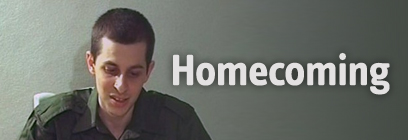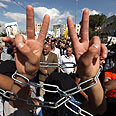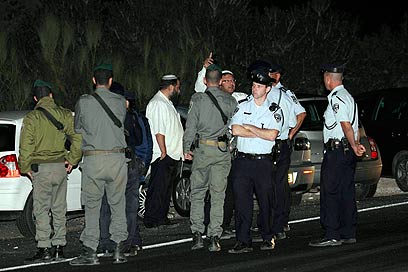



All 477 prisoners set to be released as part of the first stage of the Shalit deal have been handed over to the Red Cross.
Police deployed dozens of road blocks in the Kerem Shalom and Eshkol area. The southern part of the sector was declared a closed military zone and traffic is prohibited. Gilad is meant to arrive at a military base near Kerem Shalom in a military vehicle after crossing over from Sinai, as the prisoners are being transported to Gaza.
Watch first images of Gilad Shalit in Egypt:
A Hamas publication reported Tuesday that buses of Palestinian prisoners have started crossing into the Egyptian city of Rafah.
The exchange was briefly delayed as two female Palestinian prisoners refused to move to the Gaza Strip from Israel and insisted instead to move to Egypt. The problem was eventually solved when one of the prisoners came around and agreed to move to Gaza, while the other will be transferred to Egypt which agreed to take her in.
Click to watch live broadcast (Hebrew narration):
One of the prisoners is Miryam Salim Tarabin, originally from Jericho, who was arrested in 2005. She was sentenced to eight years and two months in prison. Tarabin is meant to be released to Gaza where her family lives.
According to reports, the second prisoner is Amna Muna, who lured teenager Ofir Rahum to his death in 2001. She is considered the leader of the female Palestinian prisoners held in Israel and previous reports suggested she terrorized inmates. It was feared that families of the prisoners will seek revenge over her abuse of the other inmates.
- For full coverage of the Shalit exchange click here
The prisoner exchange operation is being managed by Operations Division chief Brigadier-General Kobi Barak. IDF Chief of Staff Benny Gantz is closely monitoring the events. Egypt is slated to provide a first sign of life from Gilad after he arrives in Rafah.
The prisoner exchange deal signaling the end of Gilad Shalit's five-year Hamas captivity began in the early hours of Tuesday morning, as the Israel Prison Service (IPS) shuttled all 477 Palestinian prisoners slated to be released as part of the first stage of the deal to their rendezvous points with Red Cross.
At 2:30 am the order for the prisoners' transfer from the Hasharon and Ketziot prisons was given. At 5 am a convoy carrying 147 prisoners left Ketziot en route to the Kerem Shalom border crossing. By 6 am, all prisoners arrived at the border crossings and are now awaiting their release expected once the transfer of Shalit to Israel is complete.
Simultaneously, a special Prison Service convoy of buses escorted by police forces arrived at the Ofer Military Prison near Ramallah. Shortly thereafter, Red Cross vehicles arrived at the spot.
Egyptian Consulate officers arrived in Hasharon and Ktziot prisons overnight to monitor the process. The prisoners were transported to the Kerem Shalom crossing near the Gaza border and the Beitunia crossing near Ramallah, ahead of the actual exchange.
The transport was being held under heavy guard, and according to Israel Radio, over 1,000 police officers were deployed across the convoys' routes to ensure both their safety and public order.
Gilad's parents Aviva and Noam Shalit, together with brother Yoel, left their home in Mitzpe Hila and are travelling to the Tel Nof base by helicopter. Gilad's grandfather, Zvi Shalit are making their way from Kityat Ata to Tel Nof escorted by police cars.
Senior Hamas official Saleh al-Aruri told the al-Quds TV network that Hamas will set the time for the release of Shalit only after the Egyptians verify that the prisoners released are in accordance with the exchange deal.
Gilad Shalit
is expected to be transferred to Rafah crossing in the morning hours, where he will be handed over to the Egyptian mediators, who will transfer him to Sinai. Once in Sinai, Shalit will be placed in the IDF's custody.
Outside Hasharon Prison, six extreme right-wing activists, including Itamar Ben Gvir, tried blocking the shuttles transporting prisoners by lying down on the road in front of them. They were detained by the prison's security forces.
Parallel to Shalit's release, Israel
will release 450 prisoners and 27 female prisoners – 280 of whom were sentenced to multiple life terms for terror offense. The IPS shuttles will liaise with the Red Cross, which will ensure that the prisoners arrive at their destinations: Some will be allowed to return to their West Bank and Gaza Strip homes and 40 prisoners are to be expelled to Qatar and Turkey, via Egypt
and Syria.
The first vehicles that left Hasharon Prison in central Israel were carrying female prisoners, most to be freed in the West Bank; and four of them, including Amna Muna, will return to Gaza, an IPS official said.
Right wing activists demonstrate outside Hasharon Prison early Tuesday (Photo: Ido Erez)
Gilad Shalit's first stop once back in Israel will be the Amitai IDF Base, where he will finally contact his family, as well as undergo a medical exam.
 |
From there he will be flown to the Tel Nof Airbase, where he will reunite with his family for the first time in over five years.
The Air Force has arranged for special transport for the Shalits to Tel Nof, and a special "sterile zone" has been set up on the base, to ensure the family's privacy. Shalit is expected to undergo a second medical exam in Tel Nof, as well.
Raanan Ben-Zur, Ilana Curiel and Roi Kais contributed to this report
- Follow Ynetnews on Facebook
- Receive Ynetnews updates
directly to your desktop

















